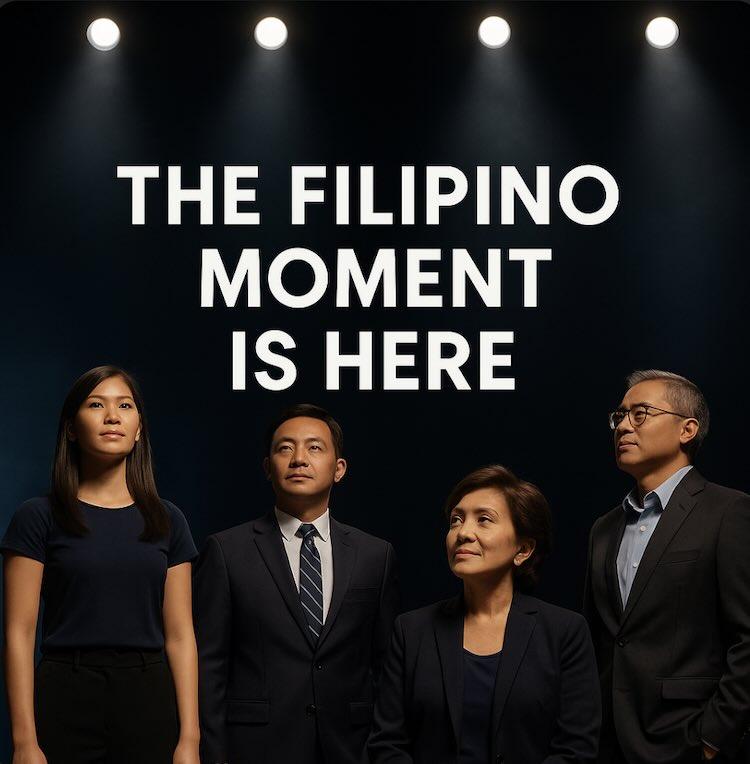There was a time—not long ago—when Filipino triumphs on the global stage were treated as exceptions. A lone boxer electrifying the world. A solo singer breaking through Broadway. A startup success story tagged as a fluke. But something has shifted. What is being witnessed now is not an accident of timing or talent. It is a coming of age.
In a year marked by global volatility and cultural fragmentation, the Filipino story is cutting through with clarity, substance, and staying power.
This vision is shared by Edgar “Injap” Sia II, co-founder of DoubleDragon Corporation, which—together with Tan Caktiong’s Honeystar Holdings—formed Hotel101 Global Pte. Ltd., the joint venture company behind the successful SPAC merger that brought Hotel101 Global to the Nasdaq under the ticker HBNB. With a post-merger valuation of approximately US $2.3 billion, the listing underscored Sia’s role in positioning DoubleDragon as a key player in hospitality-driven real estate ventures. Together, they represent a new generation of Filipino business leaders transforming local success stories into globally competitive brands.
On Broadway, the 78th Tony Awards marked a cultural breakthrough. Three Filipino Americans were honored in one night: Nicole Scherzinger won Best Leading Actress in a Musical for Sunset Boulevard; Darren Criss, already an Emmy winner, became the first Asian-American man to win Best Leading Actor in a Musical for Maybe Happy Ending; and Marco Paguia, a longtime music director and orchestrator, received a Special Tony Award for his work on Buena Vista Social Club. It was not a token moment, it was a generational arrival.
At the 2025 Grammy Awards, Bruno Mars reaffirmed his place in global music history, taking home multiple wins and delivering another genre-defying performance. In the realm of classical and contemporary music, Filipina-American composer and percussionist Susie Ibarra made history as the 2025 Pulitzer Prize winner for Music for her composition Sky Islands, a groundbreaking work inspired by the highland rainforests of Luzon. Filipino artistry is no longer confined to familiar genres, it now reverberates across orchestral halls, experimental stages, and global platforms.
Boxing, long a point of national pride, is also evolving. Inspired by Manny Pacquiao, the only eight-division world champion in boxing history and a 2025 inductee into the International Boxing Hall of Fame, a new generation of disciplined, media-savvy Filipino fighters is emerging across both men’s and women’s divisions. Athletes such as Irish Magno, the first Filipina boxer to qualify for the Olympics, and Hergie Bacyadan, who qualified for Paris 2024, exemplify this shift. The sport now benefits from more scientific training methods, greater digital visibility, and the strong support of a globally engaged diaspora.
In politics, both in the Philippines and abroad, Filipinos are asserting a stronger voice. The diaspora is electing mayors, legislators, and judges across the U.S. and Canada. At home, youth participation in civic life is rising. And within policy circles, Filipino professionals are stepping into spaces once closed off—think tanks, legal courts, development banks, and international NGOs.
Across boxing gyms and boardrooms around the world, and the halls of political power in the United States, Filipino Americans are gaining visibility, legitimacy, and—more importantly—power. They are no longer confined to symbolic appointments. From elected leaders like Rep. Bobby Scott, the longtime congressman from Virginia and the first voting member of the U.S. House with Filipino ancestry, they are rising through state legislatures, mayoral offices, congressional seats, courtrooms, and policy think tanks. Filipinos are not just being invited to the table—they are building new ones.
What connects all these achievements is the transition from moment to movement. The early architecture of a Filipino pipeline is becoming visible—one that identifies potential, nurtures it, and connects it to global opportunity. Whether in tech incubators, sports academies, or creative collectives, Filipino communities are investing in systems that produce excellence, not just celebrate it.
Yet the work is far from finished. A true coming of age requires sustained effort. It requires broadening access to opportunity—not just for the privileged few, but for those from underserved communities with talent yet to be tapped.
That means developing ecosystems: in arts education, sports training, political leadership, and tech innovation. It means backing Filipino-led venture capital, media production, philanthropy, and policymaking. It means understanding the Filipino story not as a sentimental underdog tale but as a strategic blueprint for collective ascent.
The challenge ahead is scaling visibility into viability. To ensure that stars like Criss, Scherzinger, Mars, Eala, Ibarra, and Salonga and the next wave of business titans like Tan Caktiong and Sia are not seen as anomalies, but as part of a widening cohort. Their rise was no accident. It resulted from persistence but also from access, programs, mentorship, and belief.
In a world where narratives are currency, the Filipino community holds more leverage than ever. But leverage without leadership is a missed opportunity.
Filipinos are no longer on the fringes. And the time has come to stop behaving as if they are.







